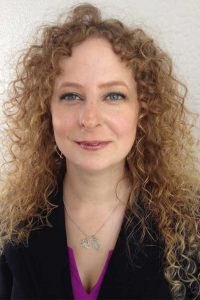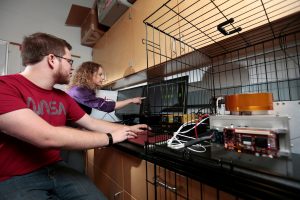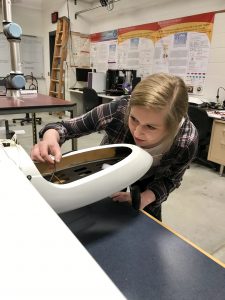Aerospace Engineering’s Rozier receives Black and Veatch Building a World of Difference in Engineering Fellowship
Author: John Burnett-Larkins
Author: John Burnett-Larkins
One of only two Iowa State researchers named to honor

It’s all about reliability and predictability of systems with Kristin-Yvonne Rozier’s Laboratory for Temporal Logic. Her work with advanced automated reasoning techniques – algorithms and tools that filter what we want vs. what we don’t want, that can apply to things like security systems and critical infrastructure – is being supported with one of engineering’s most prestigious honors.
Rozier has been named a recipient of a Black and Veatch Building a World of Difference Fellowship. She is one of only two Iowa State University researchers to be named in the most recent awarding period.
A cornerstone of the fellowship is Black and Veatch’s belief in the need for innovation to address the long-term needs for sustainable infrastructure and the strong belief in the role that education must play to support new solutions.

“My research directly contributes to the Black and Veatch core values of safety, sustainability, and responsibility by creating innovative algorithms and tools to automatically derive safety requirements, check that critical infrastructure systems uphold these requirements, and create cheaper, less-resource-intensive, faster, and more scalable ways to verify and maintain these systems,” Rozier says.
By harnessing the power of formal methods, Rozier says scientists can reason both about the presence of emergent system behaviors that are wanted, and the absence of system behaviors not wanted. Her research is branching into utilizing machine learning in combination with data-driven and formal reasoning techniques. Applications range from creating more robust systems against security threats to ensuring that critical systems, like water and power systems, are safe and dependable.
“In order to build the sustainable infrastructure of the future, we must be able to validate that we have correctly captured what it means for a system to be safe, verify that core requirements for safety and sustainability are integrated into the system at every stage of development, from design to deployment, and ingrain deployed systems with smart monitors that both reduce the burdens of maintenance and ensure greater reliability,” she says.
Rozier’s research incorporates a wide range of participants, with a particular eye toward students who are deserving of opportunities.

“Research in my laboratory comes together from an inclusive collaboration of a diverse team of researchers at all levels, from freshmen to postdocs,” she says. “As minority students tend to be under-mentored, which can leave students unaware of their potential and their options for graduate studies or careers, I have cultured an environment supportive of underrepresented groups.”
Rozier points with pride to the fact that the undergraduate population in her lab has historically been 50% female, with disproportionately many students from underrepresented groups, including racial minorities, LGBTQ+, and economically disadvantaged backgrounds. There are currently 30 undergraduate researchers in the lab, from majors that incorporate three different Iowa State engineering programs in addition to aerospace engineering.
The Black and Veatch fellowship appointment is for a three academic years term and appointments will be effective until August of 2023.
Additional research, additional funding
Rozier has also recently received major funding for other research projects her lab is involved in, including a National Science Foundation (NSF) award of $1.2 million for “Resource-Aware Hierarchical Runtime Verification for Mixed-Abstraction-Level Systems of Systems.” The research addresses the issue of complex systems used in aircraft and spacecraft that must work in concert for optimal results.
“We adapt techniques from formal methods, control theory, hardware-software integration, and software engineering to design runtime monitors that inspect cyber-physical systems of systems without interfering with their normal operation,” Rozier says.
She is the primary investigator on the project with co-investigators Philip Jones, associate professor of electrical and computer engineering at Iowa State and Borzoo Bonakdarpour, formerly of Iowa State’s department of computer science and now a researcher at Michigan State University.
Rozier is also starting a project with the Naval Research Laboratory (NRL) contributing to two subtasks for the ADAS (Assured Development of Autonomous Systems) program, one on requirements elicitation and formal modeling and the other on runtime verification. That contribution will begin this year and will continue for the next four years.
She also received a National Science Foundation INTERN supplemental grant for Ph.D. student Matt Cauwels, who will be working on runtime verification for autonomous systems, applying to the autonomous car industry (through a local Ames, Iowa startup business, Etalyc).
Rozier also recently received a research experience for undergraduates (REU) supplement for a previously-awarded NSF CAREER grant. It allowed her to spend the summer advising undergraduate researchers on two projects under that grant, in addition to advising two REU students in the Summer Engagement in Cyber Undergraduate Research Experiences (SECURE) program at Iowa State. The two CAREER students worked on projects on requirements elicitation for unmanned aerial systems and on runtime verification. The SECURE students worked on a project using formal methods for Internet of Things (IoT) security (view a video of their work).
Finally, Rozier is the primary investigator on a significant model-checking research program that has been supported by a $1.5M grant from the NSF’s CISE Community Research Infrastructure division for computer and network systems. “Developing an Open-Source, State-of-the-Art Symbolic Model-Checking Framework for the Model-Checking Research Community” will have a fundamental impact in this arena. More information on this project will be available soon.